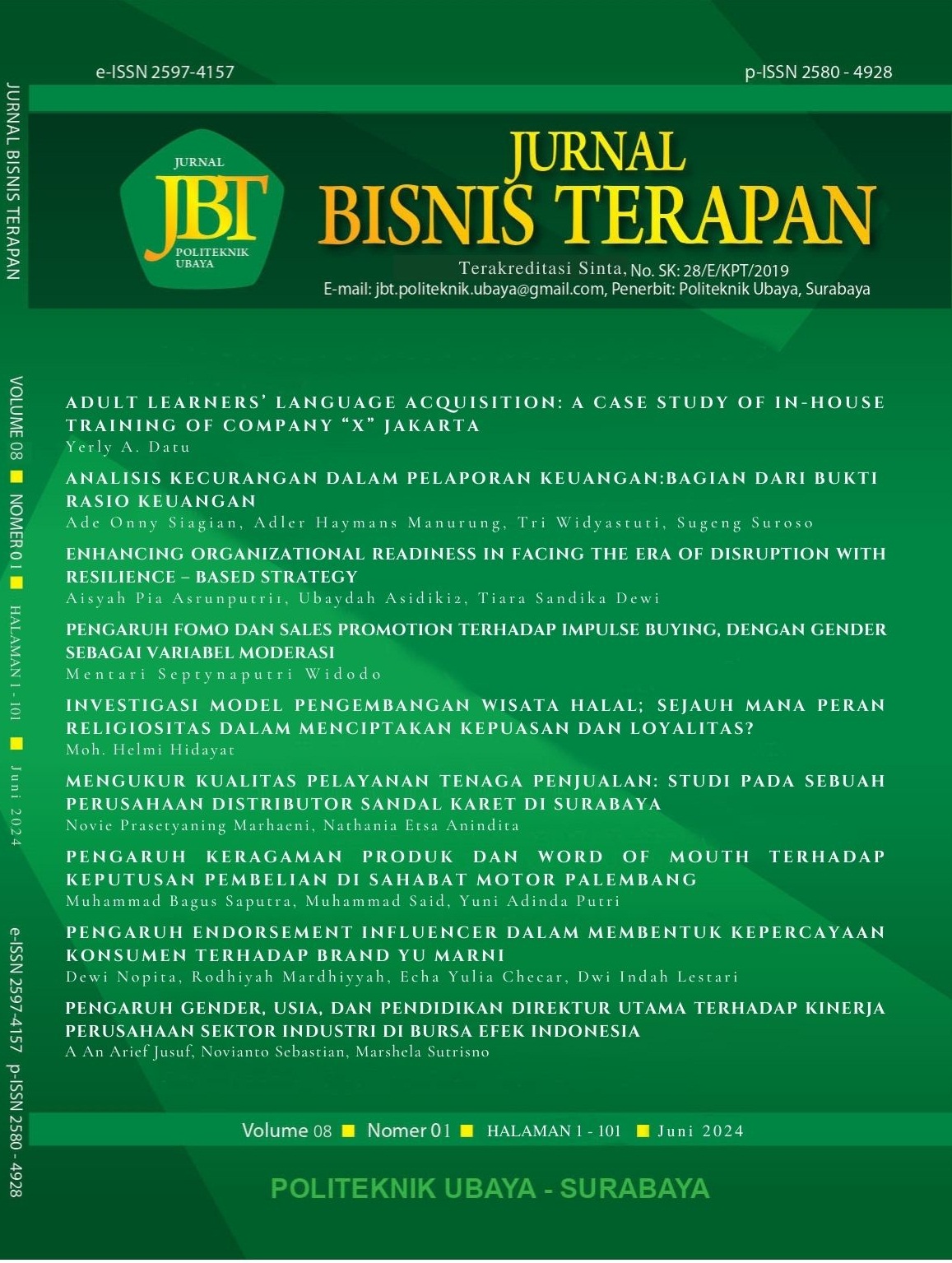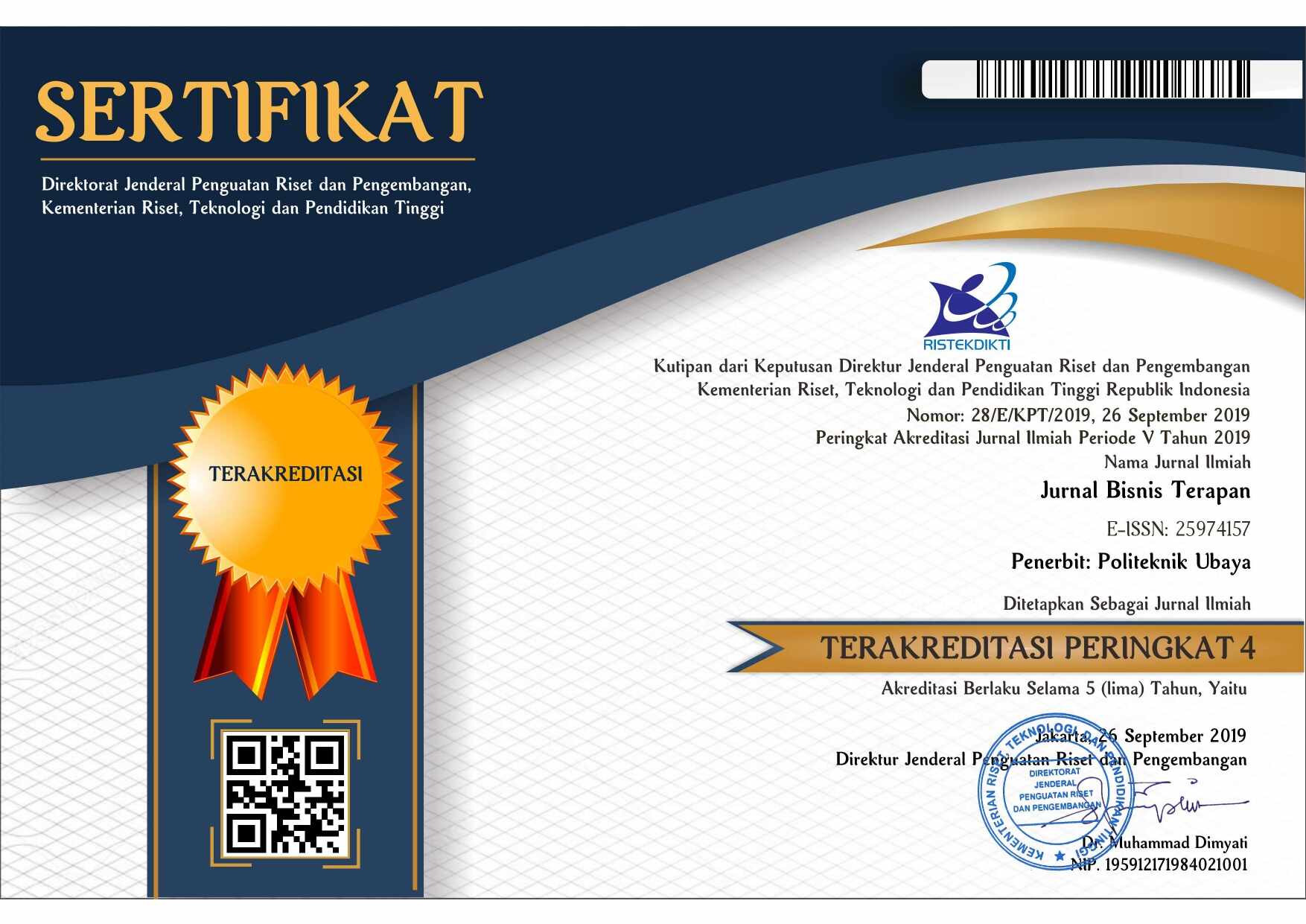ADULT LEARNERS’ LANGUAGE ACQUISITION: A CASE STUDY OF IN-HOUSE TRAINING OF COMPANY “X” JAKARTA
 Abstract Views:
503 times
Abstract Views:
503 times
 PDF Downloads:
253 times
PDF Downloads:
253 times
Abstract
The acquisition of English proficiency among adult learners is essential in today's globalized world, where English serves as the lingua franca of international business and communication. The demand for English proficiency extends beyond external business interactions to internal organizational processes, where effective communication within multicultural teams is crucial for collaboration and productivity. To thrive in the interconnected global economy, Indonesian companies must invest in English language training initiatives to equip their workforce with the necessary skills to navigate diverse work environments successfully. This descriptive qualitative study employing a case study approach aims at describing language acquisition of participants attending an in-house training called Business English program, obstacles faced, strategies applied as well as results obtained. The study also provides an overview of two analyses concerning challenges and strategies in adult language acquisition. The findings summarize participants’ profiles, revealing a gender skew towards females and varying levels of confidence despite strong motivation levels. Notably, it highlights that 75% of participants displayed mediocre speaking ability, while 25% exhibited low proficiency. Additionally, 75% had low confidence levels, contrasting with one participant's high confidence. All participants demonstrated strong motivation. Furthermore, improvements in fluency and accuracy skills are evident across participants, with scores increasing by an average of 7.9%. This indicates the effectiveness of instructional strategies in enhancing language proficiency. The analysis underscores the complex interplay between participant characteristics, instructional approaches, and language learning outcomes, offering insights for educators to tailor pedagogical strategies and create supportive environments conducive to adult language acquisition.
Downloads
References
Anugrah, A., & Pratiwi, D. (2023). The Significance of English Communication Competence in Indonesian Companies: Insights from a Survey Study. Journal of Business Communication, 45(3), 321-335.
Brown, E., & Lee, S. (2021). Exploring Flexible Approaches to Language Instruction for Adult Learners. Journal of Adult Education, 45(2), 123-137.
Chen, L., et al. (2023). Integrating Cultural Competence into Language Acquisition Programs for Adult Learners. Journal of Multilingual and Multicultural Development, 44(3), 245-261.
Crystal, D. (2003). English as a Global Language (2nd ed.). Cambridge University Press.
García Mayo, M. P., & García Lecumberri, M. L. (2021). The Role of Explicit Instruction and Feedback in Language Acquisition for Adult Learners. Applied Linguistics, 43(4), 421-437.
Graddol, D. (2006). English Next: Why Global English May Mean the End of 'English as a Foreign Language'. British Council.
Gupta, A. F. (2011). The Importance of English in the Business World. International Journal of Business and Social Science, 2(5), 90-94.
Johnson, M. (2020). Motivation in Language Learning: Understanding the Role of Intrinsic Motivation among Adult Learners. TESOL Quarterly, 54(3), 301-315.
Lo, Y. L., & Li, W. W. (2004). Employers’ Perspectives on the Importance of English Proficiency in the Hiring Process. Journal of Employment Counseling, 41(1), 2-10.
Nguyen, T., & Guo, J. (2021). Leveraging Prior Knowledge in Language Acquisition: Implications for Adult Learners. Language Learning, 71(S1), 145-163.
Smith, R., et al. (2022). Enhancing Language Learning through Authentic Materials: Insights from Adult Learners. Language Teaching Research, 26(1), 45-62.
Susanti, N., & Rahmawati, D. (2018). English Communication Competence in Indonesian Companies: A Survey Study. Journal of English Language Teaching and Linguistics, 3(1), 1-15.


This work is licensed under a Creative Commons Attribution-NonCommercial-ShareAlike 4.0 International License.

Ciptaan disebarluaskan di bawah Lisensi Creative Commons Atribusi-NonKomersial-BerbagiSerupa 4.0 Internasional.
-
Articles published in Jurnal Bisnis Terapan are licensed under a Creative Commons Attribution-NonCommercial-ShareAlike 4.0 International (CC BY-NC-SA 4.0) license, which permits anyone to copy, transform, or redistribute articles for any lawful purpose in any medium, provided appropriate credit is given to the original author(s) and Jurnal Bisnis Terapan is recognized as its original publisher. A link to this license should also be provided. Any derivative work of an article published in Jurnal Bisnis Terapan must also be shared under the same (or compatible) license.
-
Both copyright and publishing rights on articles are retained by the respective author(s), without restrictions. Only a non-exclusive license is granted to Jurnal Bisnis Terapan to publish the article and identify itself as its original publisher.

 DOI:
DOI:






